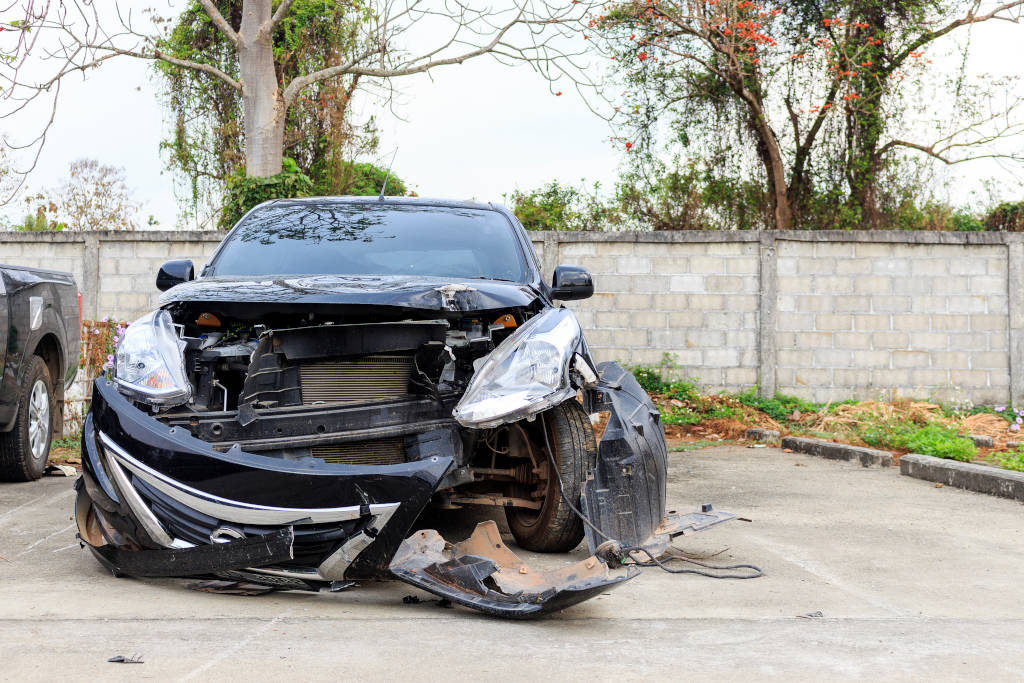Do you have a car with a salvage title brand? It may be harder to find auto insurance if you own one. This article will help you understand what it means when a vehicle has been salvaged and how it affects your ability to buy coverage.
Salvage Title Basics
Salvaged vehicles have been declared a total loss and unworthy to repair by insurance companies or registered owners. A car is a totaled when the cost of repairs surpasses its market value.
Auto insurance companies declare a car a total loss if it falls within a certain percentage of the car’s value (ACV), such as 50 to 90%. It’s important to note that each state and insurer has its own idea of what totaled means.
Totaled cars are usually the result of major damages. Common examples include:
- Collisions with other cars or objects
- Natural disasters such as tornadoes, floods, and earthquakes
- Vandalism
- Theft, either of your car or hard-to-replace parts
Once you or your insurance provider label your car a total loss, you must report it to your state as a salvage. Your state will issue your car a salvage certificate. This makes it illegal to drive on public roads and highways. You have some options if you have one of these vehicles. You can:
- Sell it
- Keep it and pay to repair it
- Keep it and use its parts, either to sell or re-use
Vehicles that undergo proper repairs and pass a thorough inspection can qualify for rebuilt status. Be aware that each state has unique inspection processes and standards when issuing a rebuilt title.
Difference Between Rebuilt and Salvage Titles
People often confuse a rebuilds with salvages. While both involve totaled cars, they have their differences. Below is some quick info on both rebuilt and salvage title vehicles:
Rebuilt Cars
A rebuild is a formerly salvaged vehicle that’s been repaired to a drivable state. Cars receive this new title branding when they receive repairs and fulfill state requirements to become roadworthy.
Requirements often include an inspection, the specifics of which vary by state. Some states, such as Washington, also require owners to complete a checklist before they can convert their title registration from salvage to rebuilt.
Because rebuilds are safe to drive, you’re likely to see them if you’re in the used car market. Many people favor them because they’re so much cheaper than vehicles with clean titles. But you could be in for a rude shock when you try to insure one. Some insurers, like PEMCO, won’t offer coverage options such as collision or comprehensive if you own one.
You may need to do the following for the state to rebrand a salvage title:
- Make sure your car has proper repairs to make it drivable
- Check your state’s requirements
- Keep records of bills of sale or receipts for parts you used to repair your car
- File the right documents (applications, forms, etc.) with your state
- Schedule an inspection
Salvaged Cars
A salvage title means that a car has been declared a total loss. These vehicles are illegal to drive or park on public roads. They must be repaired and inspected before you can drive them.
Buying a Car with a Salvage Title
Buying a vehicle with a salvage title could save you money, but it can also be risky. You’ll likely have a tough time finding insurance and may face some expensive repairs. Consider that salvages have sustained damage to the point where they’re no longer road-worthy. If you wanted to drive one, you’d have to take the steps to get it rebuilt branded on the title.
There is a salvage industry with a variety of ways consumers can purchase and have these vehicles hauled somewhere for repair. Some of your best bets include:
- Salvage auctions. Auctions are typically where salvage title cars are sold. Example of salvage auction companies include: Copart, Insurance Auto Auctions (IAA), and Manheim. These auctions are held all across the country and are accessible by licensed dealers, dismantlers, rebuilders, and even the general public.
- Auto salvage yards. Most people know these as recycling centers or junkyards. These businesses buy salvages with the intention of stripping them for parts. You may be able to acquire one for your own vehicle reconstruction project.
- A trusted mechanic. Someone with deep knowledge of vehicle damage and repair can give you an idea of how much work a particular salvage title car might cost to repair.
Salvage Title Pros and Cons
Buying a salvaged car could be more trouble than it’s worth for most people. Below are some pros and cons of buying one of these vehicles:
Pros
- You could save money. These vehicles cost less money because they’re damaged and need a lot of work to fix. You could save money if you have the time, experience, or resources to repair a wrecked car, especially if you buy a car that would normally cost a lot more.
- You might be able to get spare parts. If you don’t repair it, you could use it for parts. This is helpful if you’re a car enthusiast and want several parts that may be pricey if bought new.
- You could get a special car. Buying a totaled vehicle might be a good idea if you happen to find your dream car or a car you want that would otherwise be too expensive. In this case, you’d be able to repair it and make it street-legal.
Cons
- Potential fraud. Vehicle sellers might leave out some crucial info and only report minor damage, even if it’s much worse. You could end up paying much more than you bargained for if you buy one of these cars.
- Hard to find coverage. Most companies won’t insure a vehicle this badly damaged. Salvage title insurance is next to impossible to obtain. Or, at the very least, you’ll be offered a liability-only policy.
- Hard to finance. Many banks and lending companies don’t want to finance these vehicles. This is because they’re hard to value due to many factors, including damage, year, make, mileage, and others.
- Hard to sell. Though they’re cheaper, these vehicles come with many risks and potential costs that may scare off some buyers. And don’t think you can hide the fact that a car’s been totaled. Anyone can request a CARFAX report on VIN numbers. If the car was wrecked, the report will show it.
- Not able to drive. Wrecked vehicles aren’t legal to drive. That means you’d have to rebuild yours if you wanted to take it on the road.
Insuring Cars with Salvage Titles
It’ll be difficult to find coverage if you own one of these vehicles. Most insurers won’t cover them because they’ve sustained so much damage that they’re unsafe to drive. It’s sometimes difficult insuring cars with salvage titles because they’re a total loss, causing concern for insurance providers.
If you do somehow find a carrier willing to write you a policy, forget about fully covering your salvaged car. Many insurers will only offer limited coverage options, leaving out collision and comprehensive auto insurance. Keep in mind that branded vehicle are usually be more expensive to insure due to their increased risks.
Salvages vehicles are also referred to as branded, which means they’re a total loss due to a bad accident, flood, fire, or theft. Insurance companies will often say that they don’t insure cars with this designation.
How Much Coverage Costs
Though many of the major carriers don’t cover salvage titles, there are still some options. While insurance companies will charge more in general to insure a salvaged vehicle, many specific factors affect rates. Insurers will often look at the following when deciding your premium:
- Your age
- Car make and model
- ZIP code
- Your driving record
- Your driving experience
You can still try to get a good deal on your policy, even though salvage cars come with higher rates than those with clean titles. It’s smart to look around the market and compare prices. That’ll help you find the best deal for your situation.
Frequently Asked Questions
Do salvaged cars cost more to insure?
This question is hard to answer. First, most major insurers don’t offer any form of salvage title insurance. There’s usually no need. Salvages are worth very little. And, since you can’t drive one, you don’t need liability. Another reason you don’t need coverage is that the car’s value will be low unless it’s an exotic or collector car. If you do manage to find a policy, it’ll likely be very expensive due to your car’s increased risk.
Can I remove the salvage title brand from my car and clear it?
The only way to remove the “salvage” branding is to rebuild it. To change the title, your car must pass an inspection and/or complete a checklist, showing that it’s fully repaired and safe to drive on public roads.
There’s no way to make your salvage or rebuilt car a clear title again, however. Owners might move to a new state and try to pass their vehicle off as a clean title. This is a form of fraud called “title washing.” For this reason, be sure to carefully review vehicle history using the VIN when you buy a used car.
Are rebuilds the same as salvages?
Rebuilds are not the same as salvages. Vehicles receive salvage title branding when owners or insurance companies declare them a total loss. Cars branded as rebuilt used to be total losses, but now have passed an inspection and are legal to drive.
Why are salvaged cars bad?
Most people steer clear of cars with salvage titles for several reasons. First, salvages are undriveable and must undergo significant repairs before they can be street worthy again. Second, no matter how much time and money you put into fixing it, a salvaged vehicle’ cannot shake it’s accident history. The salvage brand will remain forever. Finally, salvaged cars may not be as safe as those with clean titles. For this reason, you may have trouble finding an insurer willing to write you a policy.
Can I get full coverage for a car with a salvage title?
Most insurers won’t offer full coverage for salvaged vehicles. You’ll likely get a more limited policy, including liability. Other options like collision and comprehensive will probably be off the table. You might not be able to cover a salvage title vehicle with any insurance policy. And honestly, you wouldn’t need to be fully covered on a vehicle with so much damage that it’s totaled. Even liability makes little sense for a car you can’t even drive.


